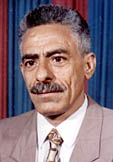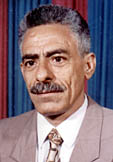
Jarallah Omar: “There is visible regression in our democratization experiment.” [Archives:1998/44/Interview]
November 2 1998
The Yemeni Socialist Party (YSP) is the party that had secured the independence of the southern part of the country from British colonial rule. It was one of two partners which achieved Yemeni unity. It is now the leader of the opposition camp. For those and other reasons, it is definitely an important player in the political scene of Yemen, and it makes a vital contribution to the nation’s democratization process.
Yet, the YSP did make some big mistakes. First of all, its former leaders attempted to break up the country, during their power struggle with President Ali Abdullah Saleh. Second, the party decided to boycott the last parliamentary elections, leaving it out of the presently sitting parliament altogether. Third, it has been more than a decade since the party rank and file elected their representatives.
To overcome those shortcomings, the YSP is attempting a re-birth. That will hopefully happen during the upcoming party congress.

Excerpts:
Q: Could you briefly tell us about the YSP’s preparations to hold its next congress?
A: In the Central Committee’s last session, it was decided that the YSP’s 4th congress will be held on November 28th. A preparatory committee is assigned the task to prepare for this.
Three major documents to be presented at the congress are almost finished ready. They are the party political program, party charter, and Yemen political report.
Q: Will YSP members residing abroad participate? How will they be represented?
A: This is quite a problem. It is actually the main reason behind the delays in convening a congress since the 1994 war. There are about 800 to 1,000 YSP leading members in exile. Most of these are prominent politicians and academics. It is very difficult for these people to attend.
So, we have decided to hold the party congress in two rounds; one for submitting the documents I just mentioned. In the second round, there will be a chance for the exiled members to take part.
Q: What is the agenda? Will there be a leadership change?
A: We will focus on political and ideological issues, drawing a clear course for the party. The agenda will be decided by the participants.
Electing a new leadership will take place during the second round. Whether that will be a wholly new leadership or not, is a matter left to the participants. We are really determined to make this congress a turning point towards democracy for the YSP.
Q: What are the changes in the YSP’s ideology?
A: There are drastic changee envisaged. Ideology will no longxer feature prominently in our program. We will concentrate more on practical issues: democracy, human rights, general liberties, social justice, modernization and several other similar topics. There will be more openness in our party.
Q: Will the YSP turn into a more liberal, Western-style political organization?
A: Frankly speaking, ever since the 1980s, the YSP has been going through internal political and ideological struggle. Our party was one of the first socialist parties to fully recognize the tumultuous world developments. Profound ideological discussions continued within YSP rank and file. The YSP was actually one of the first parties to call for political pluralism, even while it was still in charge in the former PDRY.
Our party was gradually moving towards democratic socialism. With this idea firmly in mind. We aim for the YSP to join the international socialist order without compromi-zing its relations with other socialist, communist and other organizations.
Our main goal is for the YSP to be open to all political and ideological movements and trends.
Q: Do you expect that a number of YSP members will resign due to differences in opinion? Is there a danger of a splinter YSP group?
A: The YSP is for all Yemenis, men and women. People can join or leave at will. They are also free to form another organization. Forming a splinter group – supported by the government or others, in Yemen or abroad – has been experienced by other parties during the last four years. YSP enemies tried to exploit its weakness immediately following its defeat in the last war to form a group under the same name. Needless to say, their efforts came to no avail.
The YSP has unique building factors, which others lack. It has become a wide social and cultural movement, gathering people with similar hopes for a Yemen with brighter future. That is why some of the people who were forced by past circumstances to leave the YSP are now coming back. We welcome them. We will certainly not prevent anyone from leaving or from coming back.
Q: Has the YSP been able to retrieve confiscated property?
A: No, it has not. YSP funds and office buildings are still under government seizure, especially its main headquarters in Aden. Part of the YSP offices in Sanaa were returned. Other parts of the offices are still occupied by some ministries. The YSP has economic difficulties. We need a lot of resources to re-build the party.
Q: Are you going to seek support from abroad?
A: We have not asked support of any body from abroad. We strongly adhering to the law of the land. In the future, maybe, we will invite people to make donations; if the party remains under ” embargo” by an intransignet ruling authority.
Q: How does the YSP see democracy in Yemen, in view of recent trends?
A: The YSP regards legislation as the correct base for our democratic development. If new laws support the democratic process and help establish civil society, then we are all for it.
The YSP is definitely against totalitarian legislations. Some of the recent laws are cause ofr concern. They diminish the present democratic margin. A good example is the new law governing public gatherings and demonstrations.
Q: You have recently visited a number of countries recently. What was the purpose of these visits?
A: The main aim was to re-establish or consolidate YSP ties with our friends in the rest of the world. I was able to meet with many prominenet public figures and representatives of political organizations and the media in Britain, France, Syria, Lebanon. The aim was to re-establish relations severed since 1994. It represents the comeback of the YSP.
Q: Have you met any Yemeni opposition people in exile?
A: Yes, I held meetings with many of them and held frank discussions on the country’s current circumstances. I met and/or talked to Mr. Abdul-Rahman Al-Jafri, Ali Salim Al-Beedh, Salim Saleh Mohammed, Mohammed Ibnul-Hussain (of the former Hameed Adden ruling family), Ibrahim Al-Wazir, and others.
We are working for all Yemenis to return home and be treated equally. No veto on anybody.
I also met with Arab leaders such as Abdul-Haleem Khaddam of Syria and other leaders.
Q: How do you assess Yemen’s democratization process?
A: Conditions in Yemen are not a cause for rejoicing, to say the least. The economy is shrinking and thus living standards are falling. Corruption is rampant. Our showcase to the world – democratization, is witnessing a regression. We are steadily going back to the old ways – to authoritarian rule.
Q: How do you assess?
A: Conditions in Yemen are not a cause for rejoicing, to say the least. The economic is shrinking. People’s living standards are going down. Security is lapsing in many instances. People are firing their eapons wildly within the capital city. Such a situation is indicative of the rapid deterioration, corruption and utter failure of the present policies.
Yemen’s conditions have worsened following the war. The opposition is not that much better, either. Largely weakened by measures taken after the war, the opposition is a reflection of the current political system. Many opposition groups carry the facotrs of their weakness within themselves.
All things said and done, the Yemeni opposition remains a bulwark against absolute totalitarainism. People are being made aware of what is going on around them and whta better alternatives are available for them. Despite that, the oppsition is still unable to carry out change.
Q: Has the YSP decided on a candidate for the presidentail elections next year?
A: We have not yet studied this matter fully. The outcome of the 1997 parliamentary elections has disheartened many people and created a feeling of apathy. This is true among the general public and the politicians. People just feel this democracy and political competition are useless.
People in authority always win because they have huge funds and a powerful media machine at their disposal. Competition thus becomes meaningless if the outcome is decided beforehand.
However, I believe this issues must be directly addressed. Every opposition must nominate its presidential candidate. There must always be hope for the future, and defeat must never be resignedly accepted.
Q: What evidence is there of the diminishing margin of democracy?
A: The public assembly draft law is good evidence. Opposition publications are being dragged through the courts. Arbirary arrests are carried out most of the time. Court procedures are a travesty of justice.
The recent raid by security on the Badr Scholastic Center and the continuing detention of its director without charges is ample evidence that the democracy is in retreat. The army is now very easily being sent to deal with internal disputes, more than 20 times during the last 2 years.
It seems that we are sliding into totalitarianism and a primitive form of despotism.
Q: What about local authority? Will it help ease some of the problems?
A: The draft law submitted by the government to parliament has not much of a local authority. If endorsed, this law will actually strengthened centralization! The unfortunate thing is that the central authority is no longer capable. It is spreading its incapcity to the governorates. The central administration is really a mixture of tribal rules and backward Ottoman administrative procedures. It is certainly not suitbale for this day and age.
According to the proposed law, governors and directors are all to be appointed by the government. What is the point of holding local elections then?
Q: Is the Pledge and Accord Document – signed by the government and the YSP before the war – still sutiable for the future?
A: Yes, I think so, since the problems identified by the document still linger on and the solutions it recommended are not fully implemented. The Pledge and Accord Document is a historic slution for a historic problem. It deals with establishing a modern state in Yemen.
Q: Any last comment you would like to concluded with?
A: I call both the ruling authority and the opposition to sit together and candidly discuss the present difficult situation. This is crucial to help the coountry avoid slipping into worse circumstances. All sides must take part in this national dialogue.
——
[archive-e:44-v:1998-y:1998-d:1998-11-02-p:./1998/iss44/intrview.htm]


